

Dreadfully Boring
... View MoreGood films always raise compelling questions, whether the format is fiction or documentary fact.
... View MoreIt’s fine. It's literally the definition of a fine movie. You’ve seen it before, you know every beat and outcome before the characters even do. Only question is how much escapism you’re looking for.
... View MoreThis is a small, humorous movie in some ways, but it has a huge heart. What a nice experience.
... View MoreIt must have been the 60's . the plot makes no sense. the characters are ridiculous. the violence is inexplicable. there are some good lines, ex" are you married? wife, children, house, everything. the whole catastrophe," but many trite ones.Good local color. I thought there was a scene of Zorba dancing with a beautiful woman. I must have been high.
... View MoreFor a movie about actively cultivating a lust for life, "Zorba the Greek" is a real downer.Anthony Quinn famously plays Zorba, a larger-than-life Greek who befriends strait-laced, uptight Alan Bates when the latter comes to claim a family home on the Greek seashore. Bates wants to reinvigorate the local mining business, but in a roundabout plot development decides he first needs timber to refurbish the mine. So he and Zorba concoct this plan to get trees down from the hillside on a sort of zip line, so that they can use them to beef up the mine, which can then be used to revitalize the mining industry. If all of this seems both impractical and needlessly complicated, it is, but don't worry, as this whole story line is treated as an aside and the whole thing fails anyway. The movie instead is much more about the two men and their interactions with local women, namely a sad French lonelyhearts played by Lila Kedrova, and a surly widow played by Irene Papas. She has good reason to be surly, as this particular Greek island is inhabited by men who want to stone her because she doesn't like any of them. That this is ultimately allowed without any of the men involved having to face justice is infuriating and puzzling, and I had to chalk it up to my own lack of understanding of the cultural context of the time and place.The women in this film are treated miserably, and what happens to them is depressing. But even without that, this whole Greek community is depressing, populated by uneducated people who live and act not much better than animals. Zorba consciously sets out to not be like them and make a joyous life out of this not very joyous situation. But one does wonder why he sticks around at all. Alan Bates's character is infuriating for a whole different reason. He's our main protagonist, yet he's so ineffectual as a human being, just standing around gazing upon the horror he witnesses without doing a damn thing about any of it, that he's awfully hard to care about. I guess we're supposed to think he's grown as a person because at the end he's able to dance wildly with Zorba on the beach, but I didn't see much of a change in his character as Bates plays him.I guess this was a pretty well made movie and a much meatier one than I expected it to be, but as I'm thinking back on it I'm realizing that I didn't really enjoy it that much.Winner of three Academy Awards in the year that saw it go up against studio juggernauts "My Fair Lady" and "Mary Poppins": Best Supporting Actress (Kedrova), Best B&W Art Direction, and Best B&W Cinematography. Additionally Michael Cacoyannis was nominated for the trifecta of Best Picture, Best Director, and Best Adapted Screenplay while Anthony Quinn received his fourth career nomination, this time as Best Actor.Grade: B
... View MoreThis movie is not for everyone. Many people may not understand it. I am from Greece and although I am very young and I have never experienced similar incidents, I have seen old Greek movies and I have listened many stories from my grandparents and parents.Yes that was the life in our villages years ago, when people were spontaneous, simple but also reckless and furious. Things changed, I don't know in a bad or in a good way because maybe now we are more ''civilized'' (if someone can define that word) but many things are lost.Anyway when this movie ended, I had a smile in my face and an optimism... It shows life as it is with ups and downs, with happiness and sadness. Even if there was a little madness, that's life and all we can do after all... is dance...
... View MoreA built-in defect of this film adaption from the source novel ALEXIS ZORBAS by Nikos Kazantzakis is its utterly invidious treatment of its female characters, indisputably it was more acceptable in a male-chauvinistic backwater when it was released in the 60s (a 7 Oscar- nominations including BEST PICTURE, DIRECTOR, LEADING ACTOR for Quiin and SCREENPLAY with 3 wins), but it sheerly renders its modern-day audience a mouthful taste of misogyny and xenophobia, to which director Kakogiannis uncompromisingly adhere.What makes me more ill-at-ease is the egregious nonchalance projected afterward by their male counterparts, after the shocking demise of the widow (Papas, the author even doesn't bother to give her a name), our young half-Greek-half-British protagonist Basil (Bates) has no remorse of his inadvertent complicity in it and never even care to contest on her behalf; as for the forlorn Madame Hortense (Kedrova in her Oscar-crowning role), her beloved "husband" Zorba (Quinn) leaves her cold body on the deathbed after a fiendish loot conducted by the village people (initiated by a few local crones), he has no motivation to bury her and let her rest in peace for the sake of their liaison, even though we all know it is a miserable one-sided infatuation, it is outrageously despondent.Anyway, if one can abide all those random grouse, the film is a competently dazzling piece of work by Cyproit director Kakogiannis, a less glamorous rigmarole compared with David Lean's A PASSAGE TO India (1984, 7/10), it is in the 1930s, a young English writer Basil visits Crete for his inheritance on the island, he encounters a larger-than-life outgoing middle-age Greek, Zorba, who volunteers to work for him and assists him in starting a mining quarry on his inherited lot, the two form a close bond meanwhile their embroilment with two widows on the island sour the Cretan hospitality of the native inhabitants, things turn uglier than one can anticipate (on a premise one doesn't familiar with its novel). Zorba, a cimbalom player (called Santouri in Greece), a character exuberant with lust for life, the living-in-the-moment sort, an illiterate but knows to address "with your permission" when prying into his boss' private affairs, Quinn's English is somewhat too proficient in context, but his effervescence effectively galvanizes the bleak conditions, he plays boisterous pranks on the monks of monastery and materializes his creative idea of transporting limber from the mountain to their land, he is an emblem of complete freedom, but as a person, he is a deadbeat libertine, Quinn's performance is headstrong but persuasive. On the contrary, Bates' Basil is bookish, genteel and even effeminate when put opposite with Zorba, if he is more or less a proxy of the author himself, he barely motivates anything, he observes, takes the advantage of being a foreign on a primal island, one time he dares to follow his heart, tragedy ensues, both characters are not as likable as they appear to be. Kedrova brings out two sides of Madame Hortense's life track, balancing her "stop the boom- boom" French foxiness with her latter compassion-inducing despair, helplessly living in her wish fulfillment. Papas, with scarce lines, delivers her powerful resentment superbly albeit it is damaged good in its conception, like Madame Hortense, women are men's appendages, this undertone is as vicious and dangerous as the macabre barbarism, all stink of passé values spiked with unfulfilled loathsomeness accumulated through one's own personal path.
... View More